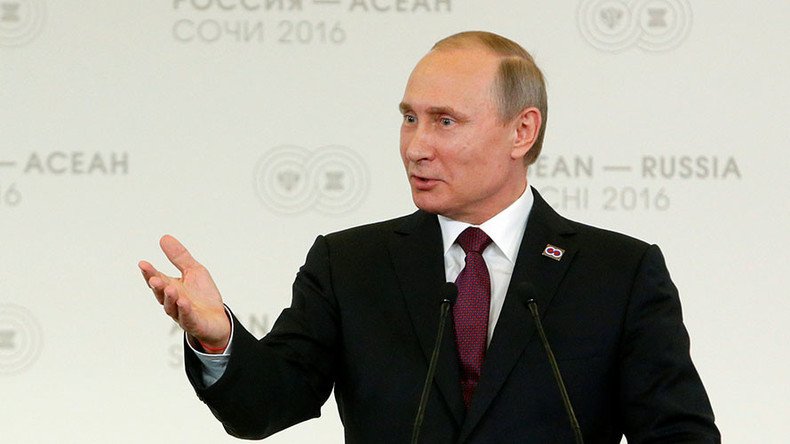US defense industry wants you to believe Vladimir Putin is responsible for Brexit

It’s time to ask a serious question here. Do NATO and US defense industry lobbyists seriously believe the Kremlin “weaponized” over 17 million British voters to leave the European Union?
Presuming the answer is no, which is surely the only logical reply here, it exposes the decrepitude of contemporary US foreign policy thinking, as demonstrated by the latest round of post UK referendum op-eds in the most influential American media outlets. It also exposes how beholden the Washington international 'expert' community it is to the defense contractors who usually fund them these days. Because trying to pin ‘Brexit’ on Vladimir Putin’s nefarious meddling is completely off-the-wall.
Especially when the average British voter, primarily exposed to Britain’s corporate press and state-run BBC, is fed a constant diet of negative messaging about Russia. According to research, the typical Brexit ‘leaver’ is a Sun or Daily Mail reader and both newspapers are notoriously anti-Russian. If you are unaware of this, here are a few sample front pages to prove it
RT @SkyNews: SUN FRONT PAGE: Putin's looters rob Brit victim. #skypaperspic.twitter.com/c9ROeCWdEZ
— dmitrij smirnov (@da_smirnov) July 19, 2014
“@SkyNews: THE SUN FRONT PAGE: "Putin's Missile" #skypaperspic.twitter.com/kFkhk67tbA”
— Juan Rangel (@jars1702) July 18, 2014
The Sun and the Mail are the two most popular newspapers in Britain and both, wholeheartedly, backed the UK’s withdrawal from the EU. It's not credible to suggest that either title did so to please the Kremlin.
As for the BBC, it broadcast a completely unsubstantiated single source; claim that Putin had a personal fortune of over $200 billion earlier this year. If that were not enough proof of its hostility to the President, Putin himself felt obliged to personally slap-down the network’s veteran correspondent John Simpson, last year after the latter targeted him, at a Moscow presser, with what amounted to a collection of British Foreign Office talking points.
Putin, Putin, Putin, Putin
Yet, the Washington and Brussels' lobbying industries just won’t let the Putin angle go. And the newspaper op-ed pages they dominate access to are only delighted to publish their ravings. Thus, we have had “senior fellows” of this, ‘directors’ of that and ‘chairs’ of God-knows-what all pushing the line that Moscow wanted Brexit. However, those who read Russian media will know that there are mixed feelings here about whether the ‘leave’ victory was a good or bad thing.
The term “senior fellow” is interesting in itself. Once reserved for academic institutions, in foreign policy circles it is now more likely to be synonymous with “lobbyist.” And a great many of these influence peddlers are funded by the armaments industry, which has an obvious vested interest in keeping tensions between east and west at hyper-intense levels.
Take a particular op-ed published in the Wall Street Journal last week, and widely circulated across social media. Titled 'How to Crash Putin's Brexit Party,' it emphasizes how “never since the Cold War has American leadership been more vital to NATO and democratic Europe.” The author, Robert D. Kaplan, is described as “a senior fellow at the Center for a New American Security.” Which sounds really fancy, doesn’t it? Also, some might remember Kaplan as a former member of the Defense Policy Board, a federal advisory committee to the United States Department of Defense.
Who Pays The Piper?
Now, a little digging shows that the “Center for a New American Security” has a very interesting list of financial backers. For instance, the likes of The Boeing Company and Northrop Grumman Aerospace Systems throw over $250,000 annually each at the organization. There are slightly smaller (between $100,000-$249,000) contributions from operators like General Atomics, the Lockheed Martin Corporation and the Raytheon Company.
Does anybody believe that these entities would be interested in supporting “senior fellows” who promote peace, tolerance and understanding?
Wall Street Journal readers are left none-the-wiser about these connections as they digest the diatribe, which is actually somewhat revealing in exposing the thoughts of Washington insiders and their financial overlords. For instance, Kaplan writes that “for decades, NATO and the European Union have silently worked in unison. The former required a foundation of European unity, and the EU to a significant extent provided that.” This seems to confirm that US elites see the EU and NATO as intertwined. An association which is normally castigated when vented from Moscow.
Kaplan goes on to state that “collective security is becoming an abstraction. The more Europe fractures, the less resolve there will be to invoke NATO's Article 5, which states that an attack on one member is an attack on all.” In other words, he’s expressing regret that NATO might miss the chance to unleash a nuclear war here. But, to the relief of Dr. Strangelove enthusiasts everywhere, he counters by saying that “the United States can fill the emerging vacuum, without overextending itself, through a deft combination of diplomacy and projected military power. If it doesn't, the victory in the Cold War will have been erased.”
For those of us who remember the USSR voluntarily dissolving, the idea that anybody “won” the Cold War seems rather odd. That said, it’s pretty obvious that the US military complex believes it was triumphant, even though the reasons for the break-up were mostly economic.
Cold is heat
Never fear though, because Kaplan still sees potential for conflict. “Great Britain should reinvigorate its alliance with America. Acting together, the two nations can still project power on the European mainland up to the gates of Russia,” he argues.
Invoking the specter of foreign troops sidling up to “the gates of Russia” isn’t aggressive at all, of course, so he clarifies that “this matters especially because Brexit has undermined a key goal of British geopolitics going back hundreds of years: preventing any one power from dominating the Continent.”
That sounds interesting, but it’s not true. Historically, Britain itself would have only been delighted to dominate Europe. And that’s partially what the Great War was about. A contest between the great powers for domination of the continent. Here, Kaplan seems to be mixing up London and Washington’s goals.
In fact, George Friedman, founder of CIA adjunct Stratfor, has repeatedly said that America’s chief European strategy, for well over a century, has been to prevent a German-Russian alliance which it perceives as the only realistic rival to its global dominance.
Next up, Kaplan really goes for a home run. “Never since the early days of the Cold War have NATO and Europe so required American leadership,” he insists. Ah, this is the classic "Europe is a petulant child that can't be trusted to tie its own shoelaces” argument. However, given that Brexit was primarily a vote for Britain to turn in on itself and resist foreign control, this seems rather misplaced.
The rise of anti-globalization movements across Europe is further evidence of the continent’s fatigue with outside interference. Not to mention the fact that even mainstream voices in the likes of the Czech Republic and Germany have been calling for Washington, and its NATO proxy, to reduce the saber rattling towards Moscow.
It’s very possible that Robert Kaplan believes what he wrote. But that would suggest his knowledge of the UK’s internal dynamics and Russia’s foreign policy is extremely limited. Which, in turn, would beg the question as to why the Wall Street Journal published him as an “expert” voice on the subject of Brexit?
Nevertheless, when carrying op-eds from “senior fellows” and other members of the think tank racket, the popular press has a duty to reveal who funds the organizations they represent. At the very least out of respect for their readers.
The statements, views and opinions expressed in this column are solely those of the author and do not necessarily represent those of RT.














